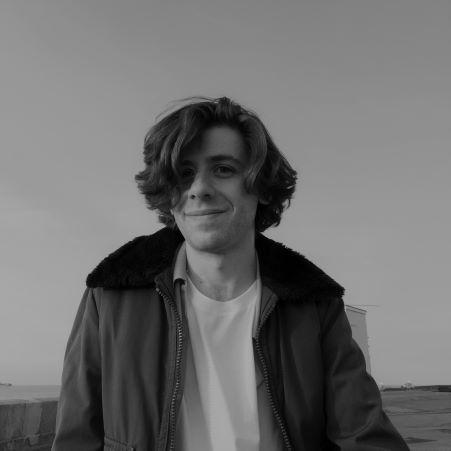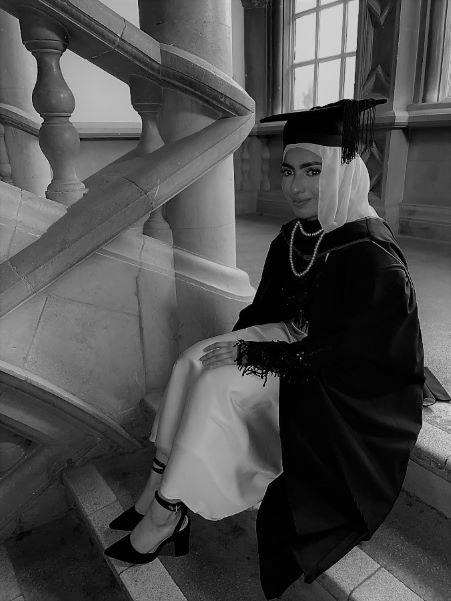-
NEW SCHOLAR SPOTLIGHT - DAN LEVY (MA STUDENT IN CULTURE, DIASPORA, ETHNICITY, BIRKBECK, 2022 TO 2024)
October 2022 Newsletter
October 18, 2022

Dan Levy is an MA student in Culture, Diaspora, Ethnicity at Birkbeck, University of London.
He began his studies in October 2022 and is interested in ways of communicating shared histories of marginisalisation between minority communities, and how doing so can form the basis for greater solidarity. He is interested in asking what factors shape our understanding of ‘solidarity’ and whether there are any limitations to working across difference. He is then motivated by the question of if/how they can be overcome.
He is also particularly curious about the East End’s radical Jewish history in the late 19th/early 20th Century, as well as the resurgence of the Jewish Labour Bund in the popular imagination.
Dan’s completed his BA in Philosophy at UCL in 2019. Since graduating, he has worked in film programming, literary publishing, and as a freelance researcher for charities and social enterprises.
He also serves on the advisory board for JW3’s youth engagement programme, Young JW3.
-
NEW SCHOLAR SPOTLIGHT - MAISHA RIYAH (MA STUDENT IN CULTURE, DIASPORA, ETHNICITY, BIRKBECK, 2022 TO 2024)
October 2022 Newsletter
October 18, 2022

Maisha Riyah is an MA student in Culture, Diaspora, Ethnicity at Birkbeck University of London. Her research will examine racialised and marginalised communities in the UK and their relation to colonialism and imperialism.
Maisha completed her BA in Politics and International Relations from Royal Holloway, University of London in 2021. Her undergraduate dissertation focused on decolonising the curriculum and how it contributes to a global International Relations. After the completion of her BA, she spent two years working for Royal Holloway and a year working in a Sixth form/secondary school teaching Politics and History.
Currently, she works full time as a Peer Support Co-ordinator under the Haringey Wellbeing Network service for the mental health charity Mind in Haringey, managing and leading the development and delivery of two models of peer support services in the borough of Haringey.
Maisha would like to increase awareness about the colonial history and deep-rooted structural racism that has strongly affected marginalised communities with their mental health and the prevalence of generational trauma that has been passed down to the younger generations.
In her spare time, Maisha enjoys outdoor activities, walking and café hopping and trying out different countries’ cuisines and loves reading and films.
-
SPOTLIGHT ON ALISON BLUNT (DEPUTY VICE-PRINCIPAL FOR IMPACT, AND PROFESSOR OF GEOGRAPHY AT QUEEN MARY, UNIVERSITY OF LONDON)
July 2022 Newsletter - Click on the arrow for more
September 9, 2022
"I’m Alison Blunt. I’m Deputy Vice-Principal for Impact with a particular responsibility for Culture, Civic and Community at Queen Mary, University of London. I’m also a Professor of Geography."
How important is it that students think about the applications of their research?
"I think it’s really important. I think PhD research has such potential to really make a difference in the world, providing new evidence, new ideas, new engagements, new ways of communicating with different audiences in terms of wanting to make a really positive difference, wanting to affect positive change beyond the academy. I think also it’s quite difficult, as PhD students sometimes to do that, in terms of the time constraints, the funding constraints of completing a PhD. Sometimes, I think - from the very outset of a PhD project - to think about what the desired impact of that might be, and thinking about what networks, what collaborations, what partnerships might help in beginning to achieve that impact, and to think about building these relationships all the way through a PhD programme. And also - hopefully with the support of the supervisor - to really value a sense of research being outward facing, being in and off the world, and really wanting to make a positive difference, and a positive impact on the world."
Is it common practice for funding bodies to encourage students to think about applying their research, or is Bonnart doing something unusual?
"I think the Bonnart Trust is really distinctive, and really inspirational in terms of the priority that it places on wanting to achieve a society that’s tolerant, and a society that’s inclusive, and seeing that as core to the research that it’s funding. I think that makes it really distinctive, and enormously inspirational, and valuable. I think there are other PhD funding bodies that fund - for instance collaborative projects - that have real potential in terms of working with collaborative partners, and providing some additional research capacity to make a positive difference through that embedding the process of collaboration all the way through from the very design of the project onwards, but those collaborative projects aren’t necessarily focused on particular priority areas. I think the Bonnart Trust, really drawing out the values, and the importance and the sense of why research matters - is really crucial and something to be hugely admired." -
SPOTLIGHT ON DAVID FELDMAN (DIRECTOR OF THE BIRKBECK INSTITUTE FOR THE STUDY OF ANTISEMITISM)
July 2022 Newsletter - Click on the arrow for more
September 9, 2022
"I’m David Feldman. I’m the Director of the Birkbeck Institute for the Study of Antisemitism. I’m also a Professor of History at Birkbeck, part of the University of London."
Has working with the Bonnart Trust influenced the way you think about your postgraduate students?
"I think working with the Trust has influenced the way I think about my students in at least 2 ways. First of all, there’s the way in which applying to the Trust requires candidates to think about - not only their subject - but the relationship of their subject to the world outside of the academy. And that’s unusual to have as a presence from the very inception of the research project. So that’s one point of difference. The other point of difference is the Trust itself as a funder. Of course, a number of research students do have funders - the Research Councils for example - but the relationship with the Research Council is not a personal relationship, it’s not an interaction in the same way as it is with the Trust, and the way in which one feels the responsibility to the Trust as well as to the student, that things ought to go as well as possible.
How do you think Trusts like Bonnart will have to evolve in the next few years?
"The Trust has already changed in a sense that it’s taken ideas about toleration - which is not a language that we use so much now - to talk about inclusivity, for example, and social justice. The ways in which these ideas are interpreted now are not the same as they were interpreted 10 or 15 years ago, or certainly 20 years ago. So I think the ways in which the Trust will change in the future will – to some extent - depend on the ways in which we continue to reinterpret ideas about inclusivity and diversity and pluralism in modern society."
-
SCHOLAR SPOTLIGHT - SHEREEN HUNTE (MA STUDENT IN CULTURE, DIASPORA AND ETHNICITY, BIRKBECK, 2020 TO 2022)
July 2022 Newsletter - Click on the arrow for more
September 9, 2022
"Hi there! My name is Shereen Hunte, and I'm a Masters student on the Culture, Diaspora and Ethnicity Masters at Birkbeck College, University of London."
What is your research about?
"Now, my research. My research centres both the black community and the Jewish community in Britain. Throughout history, throughout British history, both of these communities have been largely defined by their racialized identities, or their status, but also by their histories of oppression and migration. Despite this, little research has been done in Britain to centre these communities, and to understand the potential for allyship and collaboration. That is where my research lies. Throughout my Masters, I have been studying on the role of whiteness, to both of these communities, I have looked into the relationship between the Shoah and history of colonialism as well. For my dissertation, I will be focusing in – on the potential for allyship for the Black community and the Jewish community in Britain going forwards. I truly believe that if we continue to learn and understand this potential, then we will be able to truly disrupt the foundations of racial and religious intolerance in this country today."
The trust can be reached by email on kerryann@bonnart.org
Please note that The Bonnart Trust and trustees do not consider direct applications.
The Trust is a registered UK Charity and is governed by five volunteer Trustees and an administrator.
Copyright The Bonnart Trust (Frederick Bonnart-Braunthal Trust). UK Registered Charity Number 1094967